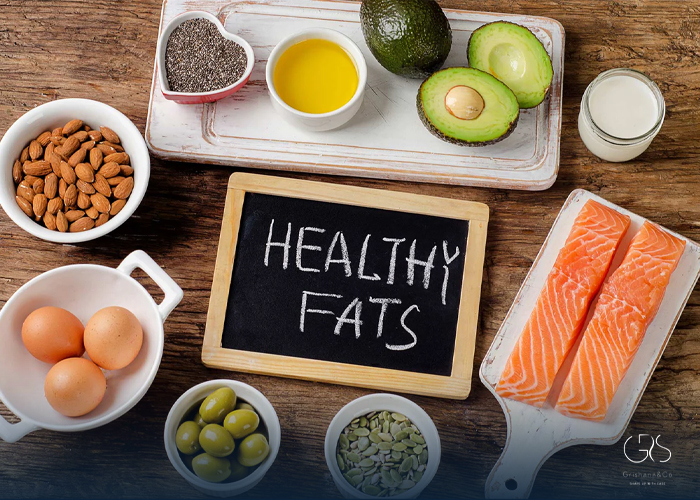Ensuring a balanced diet involves meeting the prescribed daily intake of essential nutrients, with a key focus on healthy fats. Healthy fats are indispensable in providing energy, insulation, and facilitating crucial bodily functions like absorbing fat-soluble vitamins. Studies have underscored the varying impact of different fats on overall health, emphasizing the importance of certain fats in promoting well-being. This article delves into the significance of healthy fats, outlining the recommended intake, various fat types, and methods for determining our fat requirements.
Types of Fat
Not all fats are created equal. There are different types of fats:
Saturated Fat
Saturated fats are typically found in animal products like meat and dairy; other sources include Tropical oils such as coconut oil and palm oil. There has been debate in the health community on the impact of consuming these types of fats. However, to maintain a healthy diet, it’s recommended to consume saturated oils in moderation.
Monounsaturated Fat
Monounsaturated fats are healthy fats found in fruits and vegetables such as avocados, nuts, and olive oil. These types of fats have been linked to lower hypertension and lower risk of heart disease.
(If you’re interested in olive oil or avocado oil , check out this informative article)
Polyunsaturated Fat
Polyunsaturated fats include Omega-3 and Omega-6 fatty acids, which are critical for heart health and brain function. Omega-3 and Omega-6 fatty acids are not produced by the body and can only be obtained through diet or supplements. Foods rich in polyunsaturated fats include fatty fish, walnuts, flaxseed, and soybean oil.
Daily Fat Intake Recommendations
There isn’t a one-size-fits-all approach to fat intake recommendations. The amount of fat you should consume depends on various factors, including your age, gender, physical activity, and overall health. According to the United States Department of Agriculture (USDA), the recommended intake for adults’ aged 19-50 is between 20-35% of their dietary calories.
To calculate daily fat intake manually, follow these steps:
- Determine the recommended percentage of fat intake, for example, 30%.
- Multiply daily calorie intake (e.g., 2000 calories) by the percentage of fat intake (e.g., 30%): 2000 x 0.30 = 600 calories.
- The number of grams of fat consumed is determined by dividing the calorie count by the fat’s caloric value. (1 gram of fats equals 9 calories): 600 calories divided by 9 equals 67 grams of fat per day.
Eating a Fat-Specific Diet
While no diet is perfect for everyone, a diet high in fat can provide health benefits, such as maintaining a healthy weight and lower cholesterol levels. Two popular fat-specific diets are:
Ketogenic Diet
The ketogenic diet is a high-fat, low-carbohydrate diet designed to encourage the body’s ketone production, a sustainable source of energy. It has been linked to weight loss and reduced inflammation. Some foods that fit into a ketogenic diet include seafood, nuts, avocados, low-carb vegetables, and healthy oils such as olive oil.
(Could you please check out my article on keto diet fruits? I’d recommend giving it a read)
Mediterranean Diet
The Mediterranean diet emphasizes a balanced mix of whole foods rich in healthy fats like fresh fruits and vegetables, nuts, fish (like salmon), olive oil, whole grains, and potentially red wine in moderation. The diet is promoted as a lower-risk diet for heart disease and chronic health conditions.
(Read more about the mediterranean diet guide.)
Sources of Healthy Fats

Apart from the food mentioned above, other sources of fat provide health benefits; these include:
- Avocado: Avocados are a highly nutritious food packed with monounsaturated fat and fiber.
(I suggest you read my article on avocado consumption. It provides more information on the topic) - Nuts: Nuts like almonds, walnuts, pistachios, and more are an excellent source of unsaturated fats and protein.(I suggest reading about the health benefits of walnuts.)
- Seeds: Many types of seeds, such as pumpkin, sunflower, and chia seed, are a great source of healthy fat and fiber.
- Oils: Plant-based oils like olive oil, canola oil, and coconut oils are a great fat source for cooking.
- Fatty Fish: These are a rich source of omega-3 fatty acids, which have been linked to reduced inflammation and lower risk of chronic diseases.
Conclusion
Incorporating healthy fats into your diet is essential for maintaining a healthy lifestyle. Fat is a vital nutrient that our bodies require daily; choosing healthy options can significantly impact our overall health and well-being. Eating a balanced diet that includes healthy fats, such as unsaturated fats, can lower the risk of heart disease, inflammation, and other chronic illnesses. A diet rich in monounsaturated and polyunsaturated fat will also boost brain function, lower blood pressure and cholesterol, improve bone health, and eliminate cravings.
Sources
- Mayo Clinic, Mediterranean diet blends healthy foods, lifestyle
- Healthline, The Ketogenic Diet: A Detailed Beginner’s Guide to Keto
- Medical News Today, Polyunsaturated fat: Everything you need to know
- NHS, Fat: the facts
- American Heart Association, Fats












